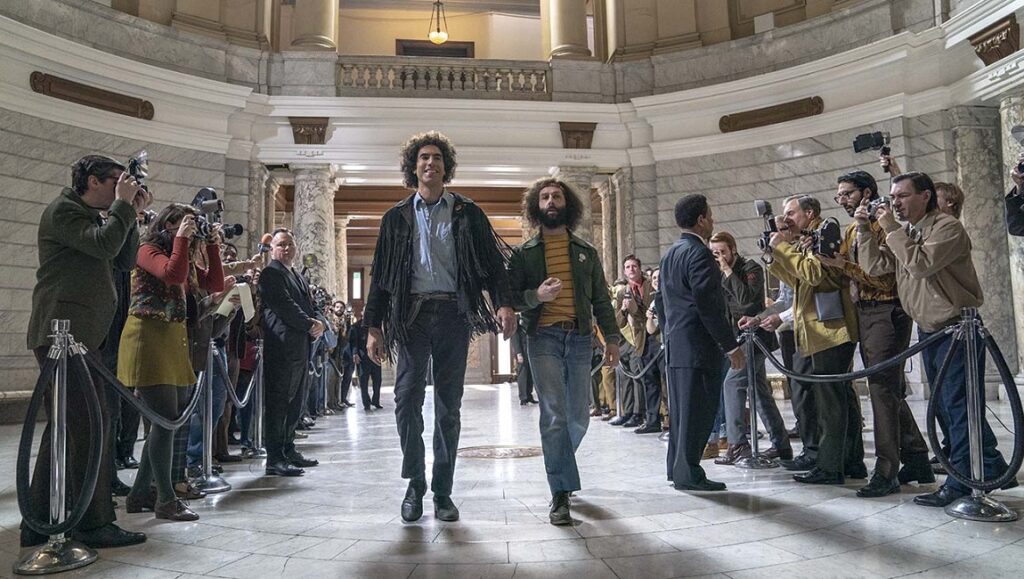Sorkin is as unsubtle as ever, but the high dramatics and contemporaneous relevance of The Trial of the Chicago 7 make for a nice fit with the writer-director’s showman instincts.
Aaron Sorkin is a better writer than filmmaker. His collaborations with directors such as David Fincher (The Social Network), Bennett Miller (Moneyball), and Steve Jobs (Danny Boyle) are all uniformly better than his 2017 directorial debut, Molly’s Game, but he’s clearly learned a few things in the interim. His latest film, The Trial of the Chicago 7, is a marked improvement on his first effort, even if the final product remains comfortably behind his scripts brought to the screen by other filmmakers.
The story couldn’t be timelier: a dramatization of the landmark 1969 trial of seven antiwar protesters who were charged in the wake of the riots at the 1968 Democratic National Convention. The events of then strongly echo the ongoing Black Lives Matter protests, and the embarrassing miscarriage of justice that continues to blame police brutality on those who oppose it. The sham trial that ensued is a prime playground for Sorkin, who is no stranger to courtroom dramas, having inserted “You can’t handle the truth!” into the popular lexicon in 1992’s A Few Good Men. The Trial of the Chicago 7 features all the lofty rhetoric, prickly dialogue, and rapid-fire zingers we’ve come to expect from Sorkin, and his tendency to underline his themes in bold strokes is on full display here. But it’s also hard not to get caught up in the sweeping dialectic repartee here, which works as both a damning indictment of our current times and a blazing historical reenactment. Much praise will also surely be focused on the cast, and rightfully so. Mark Rylance is one of the best actors working today — an unassuming titan whose craft is nearly invisible. But each ensemble member shines in their own way, especially Sacha Baron Cohen as the irascible Abbie Hoffman, who delivers his finest performance yet (outside his coterie of outrageous prank characters from Da Ali G Show and This is America).
Sorkin, for his part, has wisely followed the example of some of his earlier collaborators, particularly Danny Boyle, often going so far as to follow Steve Jobs’ emotional beats nearly note for note, replete with a heart-racing Daniel Pemberton score. Sorkin’s didacticism is often his own worst enemy, but he mostly keeps his worst instincts in check here, and there are times when he almost seems to channel the great Otto Preminger, whose Anatomy of a Murder is perhaps the gold standard for courtroom dramas. Sorkin may not be a great cinematic stylist, but there’s a certain shrewdness to his writing that turns even the most mundane events into the stuff of high drama. And while the climax hinges on a character revelation (along with a mock cross-examination that never comes to pass) that feels like it’s being forced to become the emotional core of an event that doesn’t necessarily need one, The Trial of the Chicago 7 nonetheless crackles with such righteous fury that’s it’s difficult to ignore its contemporaneous relevance. It’s the kind of film that desperately wants to be regarded as important, and it makes no bones about its parallels with current events, but Sorkin’s lack of subtlety often works in his favor here. Sorkin is ultimately a showman, and The Trial of the Chicago 7 is an unabashed broadside against Donald Trump’s America that aims directly for the cheap seats. That it ultimately falls short by shamelessly dabbling in liberal boomer nostalgia is almost beside the point. Even lacking a more accomplished director to artfully locate the humanity within his purple prose, Sorkin can still put on a hell of a show.
You can stream Aaron Sorkin’s The Trial of the Chicago 7 on Netflix beginning on October 17.


Comments are closed.